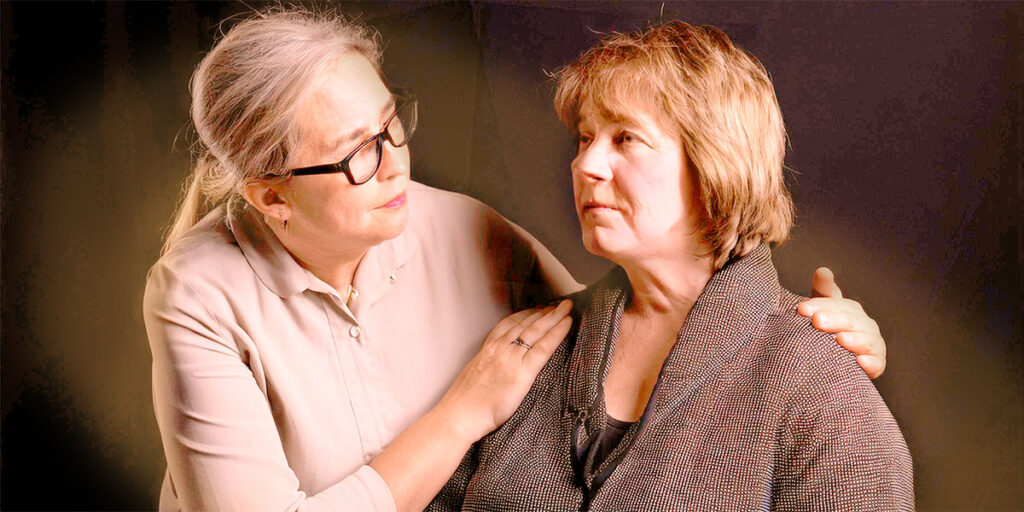Guest article by Bella Reilly.
There are times when we all need some new ideas to help a loved one living with a chronic health condition. The essence of your support transcends mere presence. It embodies a beacon of hope, resilience, and unwavering care that significantly uplifts their spirit and quality of life. This guide delves into unique and meaningful ways to extend your support, ensuring their path is met with compassion and holistic assistance.

In the journey alongside a loved one grappling with a chronic health condition, the essence of your support transcends mere presence. It embodies a beacon of hope, resilience, and unwavering care that significantly uplifts your loved one’s spirit and quality of life. We hope this guide helps you discover unique and meaningful ways to extend your support so that you can better meet your loved one’s needs with compassion and holistic assistance as a caregiver.
Ways to deal with Chronic Pain
Assisting a loved one who experiences chronic pain requires patience and a willingness to explore new options. Not every patient experiencing pain handles it in the same way, nor is one treatment beneficial for all. This is where your understanding and perseverance can be a blessing.
- Physical Therapy: Engaging in physical therapy can help alleviate chronic pain by strengthening muscles, improving mobility, and reducing strain on the body.
- Acupuncture: An ancient Chinese practice that involves inserting thin needles into specific points on the body. Acupuncture can help balance the flow of energy or life force — traditionally known as the qi “chee.” — acupuncture treatment is said to flow through these points along pathways called meridians in your body, releasing pain-relieving chemicals.
- Physical Therapy: Special diets and exercise can help with chronic pain.
Alternative treatments offer various ways to tackle chronic pain, each with its own methodology and benefits, providing options for those who seek non-traditional methods of pain management.
Cultivating Serenity and Enjoyment
Encouraging activities that foster relaxation and enjoyment is vital for emotional and physical health. As a caregiver, it can help to introduce your patient or loved one to calming music, meditation practices, mindfulness exercises, or serene walks in nature, which can create peaceful escapes from the stress of pain in their daily life. These moments of tranquility are invaluable, offering solace and rejuvenation amidst ongoing health challenges.
Deepening Your Understanding and Capability
A profound way to support your loved one is by deepening your understanding of their condition. This dedication might inspire you to enhance your capability to assist them. You may even find you have an affinity for this kind of work and can consider pursuing a bachelor’s degree in nursing. With the advent of flexible online programs, acquiring specialized knowledge to provide targeted care is more accessible, empowering you to offer informed and compassionate support.
Introducing Professional Touches to the Home Environment
Sometimes, offering support means bringing in external help to improve their living conditions. Arranging for a professional cleaning service to refresh their home can make a substantial difference. This uplifts the home’s ambiance and contributes to a stress-free, healthier living space, allowing your loved one to focus more on their well-being.
Optimizing the Home Workspace
Some instances of caregiving involve making someone who is physically challenged but still able to work more comfortable. Crafting a conducive work environment is critical to mitigating stress for those working from home. Tailoring a home office that is comfortable and free from distractions can dramatically improve a person’s work experience. This initiative not only aids in maintaining productivity but also ensures their work does not exacerbate health challenges.
Enhancing Accessibility Within the Home
Adjusting the home to meet mobility needs is a critical aspect of support. Simple modifications like installing handrails or customizing furniture arrangements can markedly enhance their independence and safety. These changes foster an environment where your loved one can navigate their space with ease and confidence.
Fostering Social Engagement and Happiness
Feelings of isolation need to be combatted. Encouragement and kindness can help your loved one to stay socially active. Participating in social events fosters connections with others and injects joy and normalcy into their lives. These experiences are pivotal, reinforcing the significance of community and shared happiness in the healing journey.
Embracing Empathy in Every Interaction
At the heart of your support is the ability to empathize. Listening with intent, acknowledging their feelings without passing judgment, and offering your presence as a pillar of comfort are fundamental. This empathetic approach strengthens your bond and provides a sense of solace and understanding that deeply comforts your loved one.
The path of supporting a loved one with a chronic health condition is filled with challenges and opportunities to make a meaningful difference in their life. You can significantly alleviate their daily struggles and contribute positively to their emotional well-being through thoughtful actions and a deep commitment to understanding their needs. Remember that your support extends beyond physical assistance; it’s a testament to your love, hope, and shared belief in a brighter, more manageable future.
Encourage healing and relief through dietary change.

Sometimes, pain in the body can be caused by an intolerance to certain foods. For instance, celiac disease or gluten sensitivity can be a source of pain and occasionally be hard to diagnose.
- Some pain symptoms that may be related to foods are:
- An overall achiness, muscle, and joint pain.
- Stomach pain
- Constipation or Diarrhea
- Bloating or swelling of hands and feet that keep recurring can be a symptom of ingesting gluten.
- Feeling puffy
- Headaches
- Itchy skin or rash
- Depression, anxiety, or feelings of hopelessness.
Giving up a delicious food you enjoy can be depressing at the outset. This is where, as a caregiver or friend, you can encourage someone suffering from a food-related issue that once they change their diet over time, they will feel better. They will also be able to enjoy food that is safe for them to eat. There are many delicious gluten-free recipes. There is no need to feel deprived these days.




